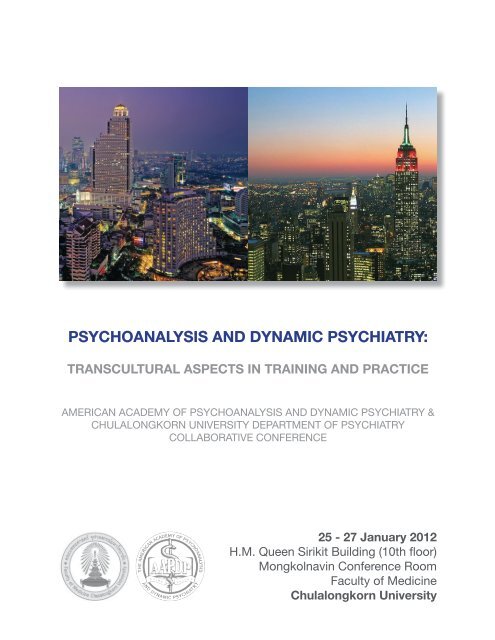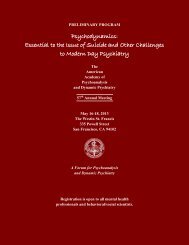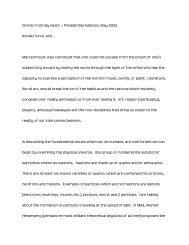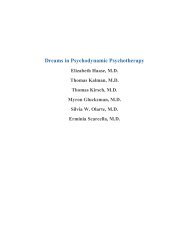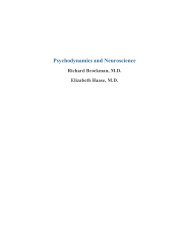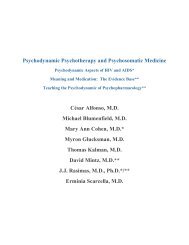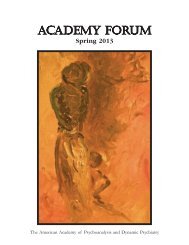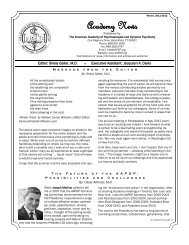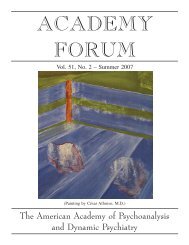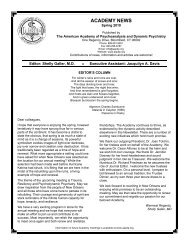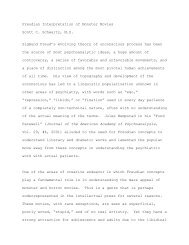Program - The American Academy of Psychoanalysis and Dynamic ...
Program - The American Academy of Psychoanalysis and Dynamic ...
Program - The American Academy of Psychoanalysis and Dynamic ...
Create successful ePaper yourself
Turn your PDF publications into a flip-book with our unique Google optimized e-Paper software.
<strong>Psychoanalysis</strong> <strong>and</strong> <strong>Dynamic</strong> Psychiatry:<br />
Transcultural Aspects in Training <strong>and</strong> Practice<br />
<strong>American</strong> <strong>Academy</strong> <strong>of</strong> <strong>Psychoanalysis</strong> <strong>and</strong> <strong>Dynamic</strong> Psychiatry &<br />
Chulalongkorn University Department <strong>of</strong> Psychiatry<br />
Collaborative Conference<br />
25 - 27 January 2012<br />
H.M. Queen Sirikit Building (10th floor)<br />
Mongkolnavin Conference Room<br />
Faculty <strong>of</strong> Medicine<br />
Chulalongkorn University
<strong>Program</strong> Schedule:<br />
26 January 2012<br />
Topic<br />
8.00 -8.30 Registration<br />
8.30 - 8.40 Welcome <strong>and</strong> Opening<br />
Opening Remarks<br />
8.40 - 9:25 “Contributions <strong>of</strong> <strong>Psychoanalysis</strong> to the<br />
Practice <strong>of</strong> Psychotherapy in the United<br />
States” (page. 9)<br />
9:25 - 10:10 “Psychiatry Residency Training in the<br />
United States” (page. 9)<br />
10.10 - 10.30 C<strong>of</strong>fee Break<br />
10.30 - 11:15 “Psychoanalytic Psychotherapy Training<br />
in China” (page. 10)<br />
11:15. - 12:00 “Overview <strong>of</strong> Psychodynamic Psychiatry<br />
Training <strong>and</strong> Practice in Thail<strong>and</strong>”<br />
12.00 - 13.00 Lunch<br />
Presenter<br />
Maj. Gen. Vira Khuangsirikul, M.D<br />
Siriluck Suppapitiporn, M.D.<br />
Sophon Napathorn, M.D.<br />
Cesar A. Alfonso, M.D.<br />
Christina Chayada Kitt, M.D.<br />
Elise S. Snyder, M.D.<br />
Parichawan Ch<strong>and</strong>arasiri, M.D.<br />
Puchong Laurujisawat, M.D.<br />
26 January 2012<br />
Topic<br />
8.30 - 9.00 Registration<br />
9.00 - 9:45 “Psychodynamic Psychiatry in the United<br />
States” (page. 10)<br />
9:45 - 10:30 “Psychodynamic Aspects <strong>of</strong> Addiction-<br />
<strong>The</strong> Use <strong>of</strong> Substances as Transitional<br />
Objects.” (page. 11)<br />
10.30 - 11.00 C<strong>of</strong>fee Break<br />
11.00 - 11:45 “Psychodynamic Aspects <strong>of</strong> Medically Ill<br />
Patients” (page. 11)<br />
11.45 - 13.30 Lunch at Tawanna Hotel<br />
Presenter<br />
Silvia W. Olarte, M.D.<br />
Christopher Perry, M.D.<br />
Luis A. Garza, M.D.<br />
27 January 2012<br />
Topic<br />
8.30 - 9.00 Registration<br />
9.00 - 9:45 “Psychodynamic Treatments in Child<br />
<strong>and</strong> Adolescent Psychiatry” (page. 12)<br />
9:45 - 10:30 “Ego Integrity in the Aging Adult”<br />
(page. 12)<br />
10.30 - 11.00 C<strong>of</strong>fee Break<br />
11.00 - 12.30 “Psychotherapy Case Conference”<br />
Coordinated by<br />
Umaporn Trangkasombat, M.D.<br />
12.30 - 13.30 Lunch<br />
Presenter<br />
Megan T. Marumoto ,M.D.<br />
Wendi M. Waits, M.D.<br />
| 1
Hosting Committee:<br />
Sophon Napathorn, M.D.<br />
รศ.นพ. โศภณ นภาธร<br />
Dean <strong>of</strong> the Faculty <strong>of</strong> Medicine<br />
Chulalongkorn University<br />
Siriluck Suppapitiporn, M.D.<br />
รศ.พญ.ศิริลักษณ์ ศุภปิติพร<br />
Director <strong>of</strong> Psychiatry, Chulalongkorn University<br />
หัวหน้าภาควิชาจิตเวชศาสตร์<br />
Umaporn Trangkasombat, M.D.<br />
ศ.พญ. อุมาพร ตรังคสมบัติ<br />
Pr<strong>of</strong>essor <strong>and</strong> Director <strong>of</strong> the Child Psychiatry <strong>Program</strong><br />
Department <strong>of</strong> Psychiatry<br />
Faculty <strong>of</strong> Medicine, Chulalongkorn University<br />
Parichawan Ch<strong>and</strong>arasiri, M.D.<br />
พญ.ปริชวัน จันทร์ศิริ<br />
Department <strong>of</strong> Psychiatry, King Chulalongkorn Memorial Hospital<br />
Developmental Paediatric <strong>and</strong> Child Psychiatrist, Bangkok Nursing<br />
Home Hospital (BNH)<br />
Puchong Laurujisawat, M.D.<br />
นพ. ภุชงค์ เหล่ารุจิสวัสดิ์ิ<br />
Lecturer.<br />
Department <strong>of</strong> Psychiatry<br />
Faculty <strong>of</strong> Medicine, Chulalongkorn University<br />
| 2
Speakers:<br />
César A. Alfonso, M.D.<br />
caa2105@columbia.edu<br />
Dr. Alfonso is President <strong>of</strong> the <strong>American</strong> <strong>Academy</strong><br />
<strong>of</strong> <strong>Psychoanalysis</strong> <strong>and</strong> <strong>Dynamic</strong> Psychiatry. He has<br />
been awarded Fellowship in <strong>The</strong> <strong>American</strong> <strong>Academy</strong><br />
<strong>of</strong> <strong>Psychoanalysis</strong> <strong>and</strong> <strong>Dynamic</strong> Psychiatry,<br />
<strong>The</strong> <strong>Academy</strong> <strong>of</strong> Psychosomatic Medicine, <strong>The</strong><br />
<strong>American</strong> College <strong>of</strong> Psychoanalysts <strong>and</strong> <strong>The</strong> New<br />
York <strong>Academy</strong> <strong>of</strong> Medicine.<br />
Originally born in Cuba, he relocated to Spain <strong>and</strong><br />
Puerto Rico for primary <strong>and</strong> secondary school.<br />
He moved to the USA in 1978 to pursue studies<br />
at Yale University. At New York Medical College<br />
he completed medical school <strong>and</strong> residency in<br />
psychiatry, followed by a psychosomatic medicine<br />
fellowship <strong>and</strong> certification in psychoanalysis. He is<br />
board certified in psychiatry, addiction psychiatry<br />
<strong>and</strong> geriatric psychiatry.<br />
His clinical interests include the psychiatric care <strong>of</strong><br />
the medically ill, psychodynamic aspects <strong>of</strong> creativity<br />
<strong>and</strong> prosocial behavior. His clinical practice<br />
includes private practice <strong>and</strong> psychosomatic medicine<br />
consultations. He has conducted research<br />
in bioethics, psychosomatic medicine, mood <strong>and</strong><br />
anxiety disorders, <strong>and</strong> non-adherence to care.<br />
Presently he holds teaching appointments at<br />
Columbia University <strong>and</strong> at New York Medical<br />
College. He teaches psychiatric residents the<br />
combined practice <strong>of</strong> psychotherapy <strong>and</strong> psychopharmacology.<br />
He is training <strong>and</strong> supervising<br />
analyst at New York Medical College Psychoanalytic<br />
Institute <strong>and</strong> on the guest faculty <strong>of</strong> the <strong>American</strong><br />
Institute for <strong>Psychoanalysis</strong>. He has lectured<br />
extensively in China (Beijing, Chengdu, Wuhan <strong>and</strong><br />
Shanghai) <strong>and</strong> at ABAC University in Bangkok.<br />
Christina Chayada Kitt, M.D.<br />
cck2115@columbia.edu<br />
Christina Chayada Kitt, MD is a fourth year psychiatry<br />
resident at Columbia-Presbyterian Medical<br />
Center in New York City. She is a Psychiatric<br />
Associate <strong>of</strong> the <strong>American</strong> <strong>Academy</strong> <strong>of</strong> <strong>Psychoanalysis</strong><br />
<strong>and</strong> <strong>Dynamic</strong> Psychiatry <strong>and</strong> a 2011-<br />
2012 Fellow <strong>of</strong> the Columbia University Center for<br />
Psychoanalytic Training <strong>and</strong> Research. She is also<br />
a recent recipient <strong>of</strong> the Humanism <strong>and</strong> Excellence<br />
in Teaching Award by the Columbia College <strong>of</strong><br />
Physicians <strong>and</strong> Surgeons class <strong>of</strong> 2013.<br />
Dr. Kitt was born <strong>and</strong> raised in the United States by<br />
Thai parents.<br />
Dr. Kitt’s mother is a graduate <strong>of</strong> Faculty <strong>of</strong> Medicine,<br />
Chulalongkorn University <strong>and</strong> her father is<br />
a graduate <strong>of</strong> Faculty <strong>of</strong> Medicine, Chiang Mai<br />
University. During middle school, Dr. Kitt spent<br />
one year studying at St. Joseph’s Convent School<br />
in Bangkok, Thail<strong>and</strong>. She returned to the United<br />
States for high school <strong>and</strong> went on to graduate<br />
magna cum laude from Georgetown University in<br />
Washington, DC with a Bachelors <strong>of</strong> Art in English<br />
<strong>and</strong> Psychology. She earned her medical degree<br />
from Georgetown in 2008.<br />
Dr. Kitt’s pr<strong>of</strong>essional interests include psychoanalysis,<br />
psychosomatic medicine, cross-cultural psychiatry,<br />
<strong>and</strong> medical student education. Following<br />
gradation from residency, she will be undergoing<br />
psychosomatic medicine (consultation-liaison) fellowship<br />
training at Columbia-Presbyterian Hospital.<br />
She is looking forward to visiting the Department <strong>of</strong><br />
Psychiatry at Faculty <strong>of</strong> Medicine, Chulalongkorn<br />
University <strong>and</strong> learning more about the practice <strong>of</strong><br />
psychiatry in Thail<strong>and</strong>.<br />
| 3
Speakers:<br />
Elise S. Snyder, M.D.<br />
elise.snyder@yale.edu<br />
Dr. Snyder is the Founder <strong>and</strong> President <strong>of</strong> the<br />
Board <strong>of</strong> Directors <strong>of</strong> CAPA (China-<strong>American</strong><br />
Psychoanalytic Alliance). She is a former President<br />
<strong>of</strong> the <strong>American</strong> College <strong>of</strong> Psychoanalysts <strong>and</strong><br />
Councilor <strong>of</strong> the <strong>American</strong> Psychoanalytic Association.<br />
She serves on the Board <strong>of</strong> the Accreditation<br />
Council for Psychoanalytic Education. Dr. Snyder is<br />
a Fellow <strong>of</strong> the <strong>American</strong> <strong>Academy</strong> <strong>of</strong> <strong>Psychoanalysis</strong><br />
<strong>and</strong> <strong>Dynamic</strong> Psychiatry <strong>and</strong> <strong>of</strong> <strong>The</strong> <strong>American</strong><br />
College <strong>of</strong> Psychoanalysts.<br />
She graduated from Medical School at Columbia<br />
University in 1958, <strong>and</strong> since 1985 has been Clinical<br />
Associate Pr<strong>of</strong>essor at Yale University. She is<br />
a graduate <strong>of</strong> the Western New Engl<strong>and</strong> Psychoanalytic<br />
Institute. Dr. Snyder is also Pr<strong>of</strong>essor <strong>of</strong><br />
Psychiatry at Sichuan University in China. She is<br />
a board certified psychiatrist who has practiced<br />
psychoanalysis <strong>and</strong> psychiatry in private practice<br />
for forty years in New York <strong>and</strong> Connecticut.<br />
Dr. Snyder has been credited for the recent expansion<br />
<strong>of</strong> psychodynamic psychotherapy training in<br />
China. CAPA, which incorporated in 2006, has over<br />
500 members internationally <strong>and</strong> has trained thous<strong>and</strong>s<br />
Chinese mental health pr<strong>of</strong>essionals over<br />
the last five years on site in China <strong>and</strong> by using<br />
videotelephony technologies.<br />
Parichawan Ch<strong>and</strong>arasiri, M.D.<br />
parichawan@gmail.com<br />
Dr. Parichawan Ch<strong>and</strong>arasiri currently serves as<br />
the Director <strong>of</strong> the Humanitarian <strong>Program</strong> for Trauma<br />
Treatment in Thail<strong>and</strong>, Cambodia, Myanmar<br />
<strong>and</strong> Indonesia. She is a child psychiatrist who is<br />
on the Faculty at Chulalongkorn University Medical<br />
School, where she obtained a medical degree <strong>and</strong><br />
completed psychiatry postgraduate training.<br />
Dr. Ch<strong>and</strong>arasiri’s interests <strong>and</strong> areas <strong>of</strong> expertise<br />
include traumatology, Posttraumatic Stress Disorder<br />
research <strong>and</strong> treatments, EMDR as an effective<br />
treatment modality, family therapy, <strong>and</strong> brief<br />
psychotherapy interventions. She has pursued<br />
these academic interests by completing training<br />
sabbaticals, clinical rotations <strong>and</strong> courses in<br />
diverse academic settings, at prestigious institutions<br />
worldwide, in countries such as Indonesia,<br />
Canada, Germany, Hong Kong, USA <strong>and</strong> the UK.<br />
She is board certified in Pediatrics <strong>and</strong> in Child <strong>and</strong><br />
Adolescent Psychiatry. She has published extensively<br />
<strong>and</strong> presented at international conferences<br />
in China <strong>and</strong> the UK recently, on topics that include<br />
new paradigms for medical student education, <strong>and</strong><br />
Eye Movement Desensitization <strong>and</strong> Reprocessing<br />
as an effective treatment for traumatized children.<br />
Dr. Snyder has been visiting China several times<br />
a year for the last ten years to teach <strong>and</strong> organize<br />
mental health services in many sites, including Beijing,<br />
Wuhan, Xian, Shanghai, <strong>and</strong> Chengdu.<br />
| 4
Speakers:<br />
Puchong Laurujisawat, M.D.<br />
doctorpuchong@yahoo.com<br />
Dr. Puchong Laurujisawat obtained his medical<br />
degree from Mahidol University <strong>and</strong> psychiatric<br />
training at Chulalongkorn University. He is board<br />
certified in Thail<strong>and</strong> in Family Medicine <strong>and</strong> General<br />
Psychiatry. He also became certified in Palliative<br />
Care at King’s College University in the UK. He is<br />
presently a lecturer in the Department <strong>of</strong> Psychiatry<br />
<strong>of</strong> Chulalongkorn University.<br />
His areas <strong>of</strong> interest <strong>and</strong> research include palliative<br />
care, medical ethics, end <strong>of</strong> life medico-legal<br />
issues, student’s health <strong>and</strong> counseling, group<br />
psychotherapy, consultation <strong>and</strong> liaison psychiatry,<br />
pain management, <strong>and</strong> psychodynamic psychotherapy.<br />
He practices as a General Psychiatrist at<br />
King Chulalongkorn Memorial Hospital <strong>and</strong> as a<br />
Consultation <strong>and</strong> Liaison Psychiatrist.<br />
Doctor Puchong is actively involved teaching medical<br />
students lecturing in medical ethics, interviewing<br />
technique, communication skills, palliative care;<br />
<strong>and</strong> training psychiatry residents in psychotherapy<br />
<strong>and</strong> pharmacotherapy <strong>of</strong> pain management, palliative<br />
care, <strong>and</strong> psychodynamic theory <strong>and</strong> practice.<br />
His publications are quite extensive, including<br />
books <strong>and</strong> chapters describing the role <strong>of</strong> psychiatrists<br />
in palliative care, <strong>and</strong> caring for the terminally<br />
ill <strong>and</strong> persons with catastrophic illness. He conducted<br />
research validating the Amsterdam preoperative<br />
anxiety <strong>and</strong> information scale (APAIS).<br />
He currently serves as a board member <strong>of</strong> the Palliative<br />
Care <strong>and</strong> Medical Ethics Educational Development<br />
committees at Chulalongkorn Hospital <strong>and</strong><br />
is a board member <strong>of</strong> the Psychotherapy Working<br />
Group <strong>of</strong> the Royal College <strong>of</strong> Psychiatrists in<br />
Thail<strong>and</strong>.<br />
| 5<br />
Silvia W. Olarte, M.D.<br />
swolarte@aol.com<br />
Dr. Olarte is an <strong>American</strong> Psychiatric Association<br />
Distinguished Fellow <strong>and</strong> a Fellow <strong>of</strong> the <strong>American</strong><br />
<strong>Academy</strong> <strong>of</strong> <strong>Psychoanalysis</strong> <strong>and</strong> <strong>Dynamic</strong> Psychiatry.<br />
She is a Clinical Pr<strong>of</strong>essor <strong>of</strong> Psychiatry<br />
<strong>and</strong> Training <strong>and</strong> Supervising Analyst at New York<br />
Medical College. She has a psychodynamic private<br />
practice in New York.<br />
She has been President <strong>of</strong> the Association <strong>of</strong><br />
Women Psychiatrists <strong>and</strong> <strong>of</strong> the <strong>American</strong> <strong>Academy</strong><br />
<strong>of</strong> <strong>Psychoanalysis</strong> <strong>and</strong> <strong>Dynamic</strong> Psychiatry.<br />
She devoted great part <strong>of</strong> her earlier career to<br />
serving the Latino population in New York City at<br />
Metropolitan Hospital where she was Director <strong>of</strong><br />
the Outpatient Department before being Director <strong>of</strong><br />
Psychiatry.<br />
At the <strong>American</strong> Psychiatric Association, she<br />
served on the Committee <strong>of</strong> International Medical<br />
Graduates, the Committee on Hispanics <strong>and</strong> the<br />
Committee on Women. She was Chair <strong>of</strong> the Task<br />
Force on Educating Psychiatrists on Ethical Issues<br />
<strong>and</strong> Chair <strong>of</strong> the Council on National Affairs.<br />
She has been the recipient <strong>of</strong> the George Tarjan<br />
Award <strong>and</strong> the Alex<strong>and</strong>ra Symonds Award. She<br />
has received the <strong>American</strong> Psychiatric Association<br />
Special Presidential Commendation <strong>and</strong> the <strong>American</strong><br />
<strong>Academy</strong> <strong>of</strong> <strong>Psychoanalysis</strong> <strong>and</strong> <strong>Dynamic</strong><br />
Psychiatry Presidential Award.<br />
She has published on women’s issues, bioethics,<br />
boundaries violations, psychodynamic treatment <strong>of</strong><br />
deprived populations, <strong>and</strong> changes in psychodynamic<br />
practice.
Speakers:<br />
Christopher T. Perry, M.D.<br />
christopher.perry@amedd.army.mil<br />
Christopher T. Perry is a graduate <strong>of</strong> <strong>The</strong> United<br />
States Military <strong>Academy</strong> at West Point, NY. After<br />
graduating from West Point, he attended medical<br />
school at <strong>The</strong> Uniformed Services University <strong>of</strong> the<br />
Health Sciences in Bethesda, Maryl<strong>and</strong> followed<br />
by completion <strong>of</strong> a psychiatric residency at Walter<br />
Reed Army Medical Center in Washington, DC.<br />
Dr. Perry is a graduate <strong>of</strong> the Washington Baltimore<br />
Fellowship in <strong>Psychoanalysis</strong> <strong>and</strong> <strong>of</strong> the International<br />
Institute for Psychotherapy in Bethesda,<br />
Maryl<strong>and</strong>. He is a Psychiatric Member <strong>of</strong> the<br />
<strong>American</strong> <strong>Academy</strong> <strong>of</strong> <strong>Psychoanalysis</strong> <strong>and</strong> <strong>Dynamic</strong><br />
Psychiatry.<br />
Dr. Perry served 4 years as a staff psychiatrist in<br />
South Korea. After this service, he completed a fellowship<br />
in Addiction Psychiatry at the University <strong>of</strong><br />
Hawaii. Currently, he serves as Chief <strong>of</strong> Inpatient<br />
Psychiatry Services at Tripler Army Medical Center<br />
in Honolulu, Hawaii.<br />
His pr<strong>of</strong>essional interests include addiction psychiatry,<br />
psychodynamic psychotherapy, <strong>and</strong> forensic<br />
work in psychiatry. He is planning to pursue<br />
Forensic Psychiatry Fellowship training.<br />
He enjoys traveling <strong>and</strong> has visited Thail<strong>and</strong> on a<br />
number <strong>of</strong> occasions including Bangkok, Chiang<br />
Mai, Chiang Rai, <strong>and</strong> Phuket.<br />
Luis Garza, M.D.<br />
lg2165@columbia.edu<br />
Luis Angel Garza, M.D. received his Bachelors <strong>of</strong><br />
Arts in Biology from Texas A&M University <strong>and</strong><br />
earned his M.D. from the University <strong>of</strong> Texas-Houston<br />
Medical School. He completed psychiatry<br />
residency at New York University. He is a Psychoanalytic<br />
Fellow <strong>of</strong> the <strong>American</strong> <strong>Academy</strong> <strong>of</strong> <strong>Psychoanalysis</strong><br />
<strong>and</strong> <strong>Dynamic</strong> Psychiatry.<br />
Following psychiatry residency, Dr. Garza cultivated<br />
his interest in cross-cultural psychiatry<br />
through the Columbia University Public Psychiatry<br />
Fellowship. His fellowship project consisted <strong>of</strong><br />
starting the Latino Inpatient Unit at Bellevue Hospital,<br />
where he later served as <strong>Program</strong> Director. Dr.<br />
Garza completed the Adult Psychotherapy <strong>Program</strong><br />
in 2004 from the Institute for Psychoanalytic<br />
Education affiliated with the NYU School <strong>of</strong> Medicine.<br />
He then continued his training at the Institute<br />
for Psychoanalytic Education affiliated with the<br />
NYU School <strong>of</strong> Medicine <strong>and</strong> completed the Adult<br />
<strong>Psychoanalysis</strong> Training <strong>Program</strong> in 2011.<br />
Currently, Dr. Garza is an Assistant Clinical Pr<strong>of</strong>essor<br />
in the Department <strong>of</strong> Psychiatry at Columbia-<br />
Presbyterian Medical Center. He works at the<br />
Lucy A. Wicks Clinic at Columbia-Presbyterian,<br />
where he treats adult outpatients with HIV/AIDS.<br />
In addition to his clinical duties, he also teaches<br />
<strong>and</strong> supervises Columbia University Psychology<br />
Interns. Dr. Garza has a private practice in Manhattan,<br />
in which he treats a wide range <strong>of</strong> patients<br />
with psychiatric <strong>and</strong> medical issues with psychoanalytic<br />
psychotherapy <strong>and</strong> psychoanalysis.<br />
| 6
Speakers:<br />
Megan Marumoto, M.D.<br />
megan.marumoto@us.army.mil<br />
Dr. Marumoto graduated from the University <strong>of</strong> Hawaii<br />
with a Bachelor in Science degree in Biology.<br />
She also received her medical school education<br />
<strong>and</strong> General Psychiatry <strong>and</strong> Child & Adolescent<br />
Psychiatry training at the University <strong>of</strong> Hawaii.<br />
She practices as a clinical Child & Adolescent<br />
Psychiatrist in an outpatient clinic at Tripler Army<br />
Medical Center in Honolulu, Hawaii. She works<br />
with youths aged 2 to 22 years old. <strong>The</strong>ir guardians<br />
are in the U.S. military.<br />
Dr. Marumoto is a clinical faculty member at the<br />
Uniformed Services University <strong>of</strong> the Health Sciences<br />
<strong>and</strong> as Clinical Associate Pr<strong>of</strong>essor at the<br />
University <strong>of</strong> Hawaii. She participates in the training<br />
<strong>of</strong> psychiatry residents <strong>and</strong> child & adolescent<br />
psychiatry fellows at Tripler Army Medical Center.<br />
Dr. Marumoto is certified by the ABPN in Adult,<br />
Child <strong>and</strong> Adolescent Psychiatry <strong>and</strong> serves as a<br />
board examiner for the <strong>American</strong> Board <strong>of</strong> Psychiatry<br />
<strong>and</strong> Neurology.<br />
She is a Psychiatric Associate Member <strong>of</strong> the<br />
<strong>American</strong> <strong>Academy</strong> <strong>of</strong> <strong>Psychoanalysis</strong> <strong>and</strong> <strong>Dynamic</strong><br />
Psychiatry.<br />
Wendi Waits, M.D.<br />
wendi.waits@us.army.mil<br />
Dr. Waits is the Chief <strong>of</strong> Behavioral Health Services<br />
at Sch<strong>of</strong>ield Barracks (a U.S. Army post) in Hawaii.<br />
Her current practice consists <strong>of</strong> outpatient work<br />
with Soldiers <strong>of</strong> all ages <strong>and</strong> their family members,<br />
including children <strong>and</strong> adolescents. Another significant<br />
part <strong>of</strong> her job is establishing <strong>and</strong> maintaining<br />
collaborative relationships with Army comm<strong>and</strong>ers,<br />
chaplains, <strong>and</strong> medical providers.<br />
Dr. Waits graduated from college at the United<br />
States Military <strong>Academy</strong> in West Point, New York,<br />
in 1994. She graduated from medical school at the<br />
Uniformed Services University <strong>of</strong> the Health Sciences<br />
(USUHS) in Bethesda, Maryl<strong>and</strong>, in 1998.<br />
She completed a residency in psychiatry at Walter<br />
Reed Army Medical Center in Washington, D.C., in<br />
2002, <strong>and</strong> a fellowship in child <strong>and</strong> adolescent psychiatry<br />
at Tripler Army Medical Center in Honolulu,<br />
Hawaii, in 2005.<br />
Between these training programs, she served as<br />
an Army psychiatrist in Dongucheon, Republic <strong>of</strong><br />
Korea, for one year. From 2005-2011, she was<br />
the chief <strong>of</strong> Inpatient Psychiatry at Tripler, <strong>and</strong><br />
completed deployments to both Iraq <strong>and</strong> Afghanistan<br />
during this time period. She has been in her<br />
current position since May 2011. Dr. Waits is a<br />
Fellow <strong>of</strong> the <strong>American</strong> Psychiatric Association, an<br />
examiner for the <strong>American</strong> Board <strong>of</strong> Psychiatry <strong>and</strong><br />
Neurology, a Psychiatric Member <strong>of</strong> the <strong>American</strong><br />
<strong>Academy</strong> <strong>of</strong> <strong>Psychoanalysis</strong> <strong>and</strong> <strong>Dynamic</strong> Psychiatry<br />
<strong>and</strong> an Assistant Pr<strong>of</strong>essor <strong>of</strong> Psychiatry at<br />
USUHS.<br />
| 7
Speakers:<br />
Umaporn Trangkasombat, M.D.<br />
familyinthai@yahoo.com<br />
Dr. Uma Trangkasombat is a Pr<strong>of</strong>essor <strong>of</strong> Psychiatry<br />
<strong>and</strong> head <strong>of</strong> Child Psychiatry <strong>Program</strong>, Faculty<br />
<strong>of</strong> Medicine, Chulalongkorn University.<br />
She completed residency in pediatrics <strong>and</strong> psychiatry<br />
at Chulalongkorn University. Afterwards, she<br />
obtained a scholarship to further her training <strong>and</strong><br />
finished a fellowship program in child <strong>and</strong> adolescent<br />
psychiatry <strong>and</strong> family therapy training at the<br />
Philadelphia Child Guidance Center, University <strong>of</strong><br />
Pennsylvania. After returning to Thail<strong>and</strong> in 1990<br />
she started teaching child psychiatry <strong>and</strong> supervising<br />
family therapy trainees. Her book titled “Family<br />
<strong>The</strong>rapy <strong>and</strong> Counseling” received the “TTF<br />
Award” as the best academic book <strong>of</strong> the year.<br />
Her interest in research includes childhood depression,<br />
child abuse, <strong>and</strong> family influences on mental<br />
illness. She has developed instruments in Thai<br />
language, to measure depression <strong>and</strong> family functioning.<br />
<strong>The</strong>se instruments have been used extensively<br />
by researchers. She received many research<br />
awards <strong>and</strong> presents her works at many international<br />
meetings. She was invited by the United Nations<br />
<strong>and</strong> the Swedish International Development<br />
Cooperation Agency (SIDA) to be the co-director<br />
for the mental health-training program for African<br />
countries. She was also invited by the United Nations<br />
Economics <strong>and</strong> Social Commission for Asia<br />
<strong>and</strong> the Pacific (UNESCAP) to be the consultant for<br />
national workshops on child sexual abuse in China<br />
<strong>and</strong> Cambodia.<br />
Dr. Uma has authored 12 books. She is currently<br />
working on new books on psychotherapy <strong>and</strong> adolescent<br />
mental health.<br />
| 8
Presentations:<br />
“Contributions <strong>of</strong> <strong>Psychoanalysis</strong> to the Practice<br />
<strong>of</strong> Psychotherapy in the United States”<br />
César A. Alfonso, M.D.<br />
“Psychiatry Residency Training in the<br />
United States”<br />
Christina Chayada Kitt, M.D.<br />
Learning Objectives:<br />
At the end <strong>of</strong> these lecture, participants will be able<br />
to:<br />
1. Identify the fundamental concepts <strong>of</strong> psychoanalytic<br />
theory <strong>and</strong> technique.<br />
2. Underst<strong>and</strong> commonalities <strong>and</strong> core practices <strong>of</strong><br />
all psychotherapies.<br />
3. Underst<strong>and</strong> how psychoanalysis has informed<br />
the contemporary practice <strong>of</strong> psychotherapy in the<br />
United States.<br />
Learning Objectives:<br />
At the conclusion <strong>of</strong> this presentation participants<br />
will be able to:<br />
1. Describe psychiatric residency core training<br />
requirements in the United States.<br />
2. Underst<strong>and</strong> psychotherapy training during<br />
psychiatric residency in the United States.<br />
3. Discuss potential post-residency career trajectories<br />
<strong>of</strong> early career psychiatrists in the United<br />
States.<br />
Abstract:<br />
<strong>The</strong> presenter will <strong>of</strong>fer a historical perspective<br />
describing how psychoanalysis developed in Europe<br />
<strong>and</strong> how it was modified as psychotherapy<br />
practice became widespread throughout the world.<br />
Definitions <strong>of</strong> psychoanalysis <strong>and</strong> psychodynamic<br />
psychotherapy will be given, focusing on similarities<br />
<strong>and</strong> differences, as well as explaining psychodynamic<br />
psychotherapy ‘s fundamental concepts<br />
<strong>of</strong> theory <strong>and</strong> technique. Finally, the presenter will<br />
explain what all psychotherapies have in common<br />
<strong>and</strong> how a unified theory <strong>of</strong> psychotherapy can be<br />
successfully applied to psychiatric education.<br />
Abstract:<br />
While there is variation among psychiatric residency<br />
training program curricula throughout the<br />
United States, this presentation will describe the<br />
core competencies required <strong>of</strong> all psychiatric<br />
residency-training programs in the United States.<br />
<strong>The</strong> speaker will provide an overview <strong>of</strong> basic<br />
psychotherapy training within psychiatric training<br />
programs. She will also describe some post-residency<br />
career options, including <strong>American</strong> Board<br />
<strong>of</strong> Psychiatry <strong>and</strong> Neurology-certified post-graduate<br />
fellowship training opportunities <strong>and</strong> options<br />
to pursue psychodynamic psychotherapy certification<br />
courses <strong>and</strong> psychoanalytic training.<br />
| 9
Presentations:<br />
“Psychoanalytic Psychotherapy Training in<br />
China”<br />
Elise S. Snyder, M.D.<br />
“Psychodynamic Psychiatry in United<br />
States”<br />
Silvia W. Olarte, M.D.<br />
Learning Objectives:<br />
At the conclusion <strong>of</strong> this presentation participants<br />
will gain underst<strong>and</strong>ing <strong>of</strong>:<br />
1. <strong>The</strong> history <strong>of</strong> psychoanalysis <strong>and</strong> psychoanalytic<br />
psychotherapy in China.<br />
2. How to develop educational programs in Psychiatry<br />
using videotelephony.<br />
3. How can countries collaborate in joint educational<br />
ventures to promote training <strong>of</strong> mental health<br />
clinicians.<br />
Learning Objectives:<br />
At the end <strong>of</strong> this presentation participants will<br />
be able to:<br />
1. Underst<strong>and</strong> the current relationship between<br />
dynamic psychiatry <strong>and</strong> psychoanalysis.<br />
2. Recognize current changes in psychodynamic<br />
training within United States.<br />
3. Compare the similarity <strong>and</strong> differences in clinical<br />
practices for both groups <strong>and</strong> discuss impact<br />
on clinical psychiatric practice.<br />
Abstract:<br />
<strong>The</strong> presentation consists <strong>of</strong> a brief overview <strong>of</strong> the<br />
history <strong>of</strong> psychoanalysis in China which includes<br />
reasons why psychoanalysis may be congenial to<br />
Chinese people. <strong>The</strong>re follows a history <strong>of</strong> the<br />
development CAPA (the China <strong>American</strong> Psychoanalytic<br />
Alliance) in China including details<br />
<strong>of</strong> CAPA’s psychotherapy training program: its<br />
core psychoanalytic psychotherapy curriculum,<br />
its advanced curriculum, clinical supervision <strong>and</strong><br />
personal psychotherapy. All <strong>of</strong> these take place<br />
on SKYPE <strong>and</strong> other video-conferencing s<strong>of</strong>tware.<br />
<strong>The</strong> presentation concludes with a discussion <strong>of</strong><br />
the advantages <strong>of</strong> distance learning for underserved<br />
areas.<br />
Abstract:<br />
This presentation will describe current practice<br />
patterns for psychoanalysts <strong>and</strong> dynamic<br />
psychiatrists in United States, highlighting their<br />
similarities <strong>and</strong> differences. It will then elaborate<br />
<strong>and</strong> clarify the current theoretical underst<strong>and</strong>ing<br />
<strong>of</strong> the relationship between psychoanalysis <strong>and</strong><br />
dynamic psychiatry. It will compare the results<br />
<strong>of</strong> two recent published studies, one surveying<br />
pr<strong>of</strong>essionals trained as psychoanalysts <strong>and</strong> the<br />
other surveying pr<strong>of</strong>essionals that while some <strong>of</strong><br />
them are trained psychoanalysts prefer to define<br />
themselves as dynamic psychiatrists. It will close<br />
by discussing on the significance <strong>of</strong> such results<br />
for both the current practice <strong>of</strong> psychoanalysis<br />
<strong>and</strong> dynamic psychiatry <strong>and</strong> the future role <strong>of</strong><br />
psychodynamics in the practice <strong>of</strong> general psychiatry.<br />
| 10
Presentations:<br />
“Psychodynamic Aspects <strong>of</strong> Addiction: <strong>The</strong><br />
Use <strong>of</strong> Substances as Transitional Objects”<br />
Christopher T. Perry, M.D.<br />
“Psychodynamic Aspects <strong>of</strong> Medically Ill<br />
Patients”<br />
Luis A. Garza, M.D.<br />
Learning Objectives:<br />
At the end <strong>of</strong> these lecture, participants will be able<br />
to:<br />
1. Underst<strong>and</strong> the role <strong>of</strong> transitional objects in<br />
development.<br />
2. Underst<strong>and</strong> how substances can serve as a<br />
transitional object during development.<br />
3. Be able to apply psychodynamic concepts to<br />
the formulation <strong>of</strong> patients with addiction.<br />
Learning Objectives:<br />
At the end <strong>of</strong> this presentation, participants will<br />
be able to:<br />
1. Underst<strong>and</strong> the historical basis <strong>of</strong> treating neurologic<br />
<strong>and</strong> medical illnesses with psychoanalysis<br />
<strong>and</strong> psychoanalytic psychotherapy.<br />
2. Discuss potential psychodynamic contributors<br />
or antecedents to medical illness.<br />
3. Apply psychodynamic concepts to management<br />
<strong>of</strong> medically ill patients.<br />
Abstract:<br />
While substance use disorders are largely genetic<br />
<strong>and</strong> biological in nature, psychodynamic underst<strong>and</strong>ing<br />
<strong>of</strong> these disorders along with somatic<br />
treatment, rehabilitation, <strong>and</strong> 12-step programs will<br />
help the patient stop using. Donald Winnicott, a<br />
pediatrician <strong>and</strong> psychoanalyst, described a transitional<br />
object as the first “not me” possession that<br />
a child has omnipotent control over. Later in his<br />
life, he described substance use as a transitional<br />
object in some people. In normal development, a<br />
child uses the transitional object for a period <strong>of</strong> time<br />
before developing further; however, substance use<br />
<strong>of</strong>ten stunts development at the point it was first<br />
used. <strong>The</strong> clinician must be able to recognize the<br />
point in development at which a patient is stuck <strong>and</strong><br />
begin to help the patient with the appropriate developmental<br />
tasks. Applying these concepts to the<br />
care <strong>of</strong> addicted patients provides insight into the<br />
psychodynamic aspects <strong>of</strong> the patient’s addiction<br />
that will allow the clinician to better help.<br />
Abstract:<br />
<strong>The</strong> presenter will provide a brief historical basis<br />
for the treatment <strong>of</strong> neurologic <strong>and</strong> medically<br />
ill patients with psychoanalysis <strong>and</strong> psychodynamic<br />
psychotherapy. Specific medical illnesses<br />
<strong>and</strong> their psychodynamic contributors will be<br />
discussed. Lastly, the speaker will provide case<br />
examples that illustrate how psychodynamic<br />
principles can be applied to the treatment <strong>of</strong><br />
medically ill patients.<br />
| 11
Presentations:<br />
“Psychodynamic Treatments in Child &<br />
Adolescent Psychiatry”<br />
Megan Marumoto, M.D.<br />
“Ego Integrity in the Aging Adult”<br />
Wendi Waits, M.D.<br />
Learning Objectives:<br />
At the end <strong>of</strong> this presentation participants will be<br />
able to:<br />
1. Identify differences between adults <strong>and</strong> children<br />
in psychodynamic psychotherapy treatment.<br />
2. Be able to discuss the psychodynamic assessment<br />
<strong>of</strong> youths.<br />
3. Be able to discuss psychodynamic treatments in<br />
children & adolescents.<br />
Learning Objectives:<br />
At the end <strong>of</strong> these lecture, participants will be<br />
able to:<br />
1. Be able to define “ego integrity.”<br />
2. Be able to name Erikson’s three life stages that<br />
occur during adulthood.<br />
3. Be able to list at least three threats to ego<br />
integrity that occur as people enter old age.<br />
Abstract:<br />
<strong>The</strong> audience will be exposed to various techniques<br />
in child & adolescent psychodynamic<br />
psychotherapy. How the approach in child therapy<br />
differs from adult therapy will be discussed. <strong>The</strong><br />
psychodynamic assessment <strong>of</strong> children will be<br />
briefly presented followed by a discussion on<br />
various play techniques. Play techniques may<br />
resonate more with the children than talk therapy,<br />
allowing them to process their psychodynamic<br />
conflicts <strong>and</strong> affect more effectively.<br />
Abstract:<br />
This presentation will explore the psychodynamic<br />
aspects <strong>of</strong> aging as related to the ego. Ego integrity<br />
will be defined <strong>and</strong> analogies will be used<br />
to provide the audience with a helpful conceptualization<br />
<strong>of</strong> this element <strong>of</strong> Freud’s “mental<br />
apparatus.” Traditional psychoanalytic views <strong>of</strong><br />
aging will be reviewed, as will Erik Erikson’s three<br />
adult stages. <strong>The</strong> speaker will discuss threats to<br />
ego integrity that occur during aging, as well as<br />
protective factors <strong>and</strong> therapeutic techniques to<br />
help aging patients preserve <strong>and</strong>/or strengthen<br />
their ego integrity.<br />
| 12
Collaborative Conference Presented by:<br />
25 - 27 January 2012<br />
H.M. Queen Sirikit Building (10th floor)<br />
Mongkolnavin Conference Room<br />
Faculty <strong>of</strong> Medicine<br />
Chulalongkorn University


